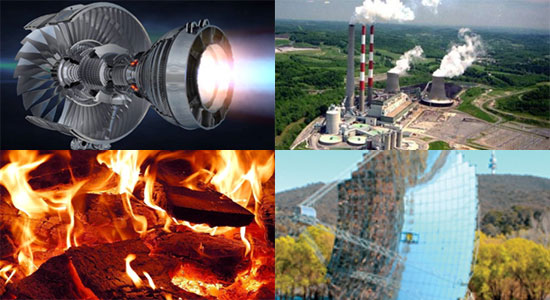
This specialized energy program will specifically work on how to improve the efficiencies of existing power plants and in helping the integration of various energy sources into and rehabilitation of the present transmission and distribution system. Efficient use of thermal energy is an increasingly popular area of interest for engineers and technologists. The objective of the Thermal Energy System Engineering (TSE) is to provide students with set of courses that will improve their capacity to analyze and design innovative thermal energy systems. These systems include, but are not limited to, energy conversion systems and their fuels, refrigeration, combustion, and solar energy.
M.Sc. TSE program offers opportunities to the graduates of academia and industry in local and international markets. Pakistan is working to not only introducing new coal fired power plants into the systems but also introducing of conversion of heat engines to combine cycle, which enhance thermal efficiency significantly high. Apart from this concept of Co-Gen should be explored so that excess heat should be utilized in thermal process, which ensures the effectiveness as high as 90%. The incessant exhaustion of fossil fuel reserves and the environmental issues associated with the utilization of these energy resources necessitate the development, not only of new conversion technologies, but also new, non-fossil fuels. These may e.g. be derived from biomass, waste, from by-products of different industrial processes or from atmospheric sources, such as the sun, the wind and the oceans.
The ability to design new, innovative energy technologies and systems will be decisive in the future, where competitiveness both in terms of efficiency and environmental issues will be fierce in order to meet market and society requirements. The MS specialization in Thermal Systems Engineering (TSE) is primarily focused on thermal energy technologies and systems, and it covers advanced aspects of energy system modelling, heat- and mass transfer, control engineering and experimental work with focus on different components and energy system aspects. The themes for the three semesters are particularly focused on Thermal Energy and Process Engineering and in-depth understanding of the technologies and scientific disciplines involved in energy conversion, utilization and transport. The education is multidisciplinary and covers the integration of general engineering disciplines, such as thermal systems, fluid- and aerodynamics.
Program objectives:
- General understanding of the design, modeling and optimization of energy systems used in various energy production applications
- Understanding the detailed operation, functionality and interaction between the various components of key thermal energy conversion technologies
- Fundamentals and applied knowledge of building energy systems, HVAC & R technologies
- Understanding solid-state and other novel thermal energy conversion approaches, including those used for waste heat utilization
- Understanding combustion processes for optimum efficiency and minimum emissions
- Detailed insight into system integration with respect to both system efficiency and control engineering aspects of energy systems
- Developing, constructing and operating thermal energy conversion technologies in the laboratory and in real applications, Insight into the topics related to the practical realization and implementation of thermal energy technologies and systems concerning both innovative aspects, business planning and economic considerations.
Focused Areas:
Thermodynamics, Thermo-Fluid, Power Plants, HVAC & R, Energy Efficiency, Enhanced Heat Transfer, Computational Fluid Dynamics, Micro/NanoFludics
Criteria and Requirements
Eligibility Criteria:
- Sc. in Mechanical Engineering
- Sc. in Chemical Engineering
- Sc./BS in mining Engineering
- Sc./BS in Industrial Engineering.
Degree Requirement: MS Program would comprise of 32 Credit Hours in both Core and Elective Courses, as well as the thesis, as follows:
- Core Courses: 12 credits
- Elective Courses: 14 credits
- Thesis: 6 credits
Seat Allocation:
Seat allocation (per semester) for Master of Science (M.Sc.) in Thermal Systems Engineering: 25 seats with 50% allocation for female candidates as per requirement of USAID. Female candidates must fulfill the university criteria for admission in M.Sc. Program.
Core Courses
12 Core Course credits required by all students enrolled in the Program.
| Course Codes | Title | Credit Hours |
| CAS-TSE 501 | Advanced Thermodynamics | 3 |
| CAS-TSE 502 | Thermal Power Plants Design and Operation | 3 |
| CAS-TSE 503 | Fuels and Combustion | 3 |
| CAS-TSE 508 | Energy Engineering Economics and Policy | 3 |
| CAS-EP 509 | Research Methodology | 2 |
| CAS-TSE 514 | Thesis Project | 6 |
Elective Course Options.
Elective Courses: 14 credits
14 Credit Hours required. Students to select Thesis: 6 credits.
| Course Codes | Title | Credit Hours |
| CAS-TSE 504 | Advanced Fluid Dynamics | 3 |
| CAS-TSE 505 | Clean Coal Technologies | 3 |
| CAS-TSE 506 | Computational Fluid Dynamics for Thermal Energy systems | 3 |
| CAS-TSE 507 | Fuel Cell and Hydrogen Technology | 3 |
| CAS-TSE 509 | Rotodynamic machinery | 3 |
| CAS-TSE 510 | Advance Heat Transfer | 3 |
| CAS-TSE 511 | Advanced topics in Thermal Energy | 3 |
| CAS-TSE 512 | Themal Desalination Systems | 3 |
| CAS-REE 509 | Solar Thermal Energy | 3 |
| CAS-REE -511 | Biomass Technologies | 3 |
| CAS-REE 512 | Geothermal Engineering | 3 |
| CAS-REE 529 | Environment Impact assessment for Energy Systems | 3 |
